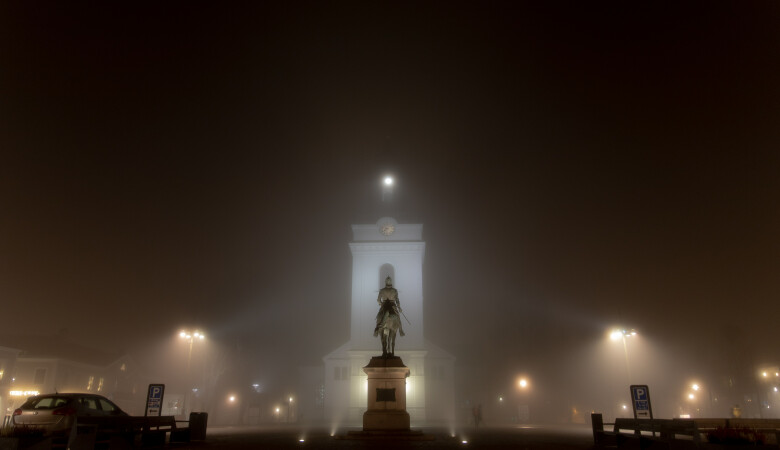The Kingdom of God: Righteousness, Peace and Joy (Romans Sermon 106 of 120)
July 02, 2006 | Andy Davis
Romans 14:17-18
Evangelism, The Kingdom of Christ
Holy and Separate, Yet Engaging Effecting Change
As we continue in our study in Romans 14 an incredibly important chapter. I think we come to the point where we are seeing one of the challenges of the church, the evangelical church in the west, the two great commands that we have really mediated to us by the Apostle Paul, and that is to come out and be separate, that we would not be polluted by the surrounding world, that we would not be defiled by this world. While at the same time that we would become all things to all people, so that by all possible means we may save some. The same one wrote both of those things. And he was serving the same Lord who said, "Father, I do not pray that you take them out of the world, but rather that you protect them from the evil one."
So how do we come out from the world and be separate? 2 Corinthian 6. And at the same time be all things to all men, so that by all possible means we may save some? 1 Corinthians 9. As I looked at Jesus, I looked to him as our ultimate example in this. How can we be evangelistically fruitful and at the same time, pure and holy in this world? That's the question. And Jesus taught us how. Now my favorite depiction of the life of Jesus in movie is Franco Zeffirelli's Jesus of Nazareth. It's still on TV. It was a TV mini series 6 hours and 16 minutes, first premiered in 1977, and I just love it. Others like the Jesus film better and it's been more widely used. But I just love the acting, I love the way the whole thing is pictured. And there's a very poignant scene right at the beginning of the call of the apostles, when Jesus works with the newly converted Peter, this big, burly fisherman who is filled with all kinds of whim and vigor and energy, and he doesn't understand why his brother Andrew, is running after all these holy men like John the Baptist.
And now here comes another one. He says, "What, another holy man, another one who tells us to wait for the future time and all that?" he said, "Show me a holy man that can put some fish in the sea, and then I'll listen to him." And then Jesus looks him right in the eye and says, "Go back out again." And he goes out and he catches that miraculous catch of fish and then Peter is incredibly humbled. Problem is, Peter has a, what he calls a "blood-sucking enemy." His blood-sucking enemy is Matthew the tax collector. And Matthew comes to his house where Jesus is there, and there's a huge group of people there, and Matthew enters Peter's house and says, Peter, I heard you had a large catch of fish. We'll talk about it later, shall we. He wants his back-taxes, and so Peter is irate that Matthew would come into his house. And Matthew says, "What about this new teacher, a rabbi whatever he is, Jesus?"
And Jesus looks up at him and says, I think that we'll have to meet at some place where we're both more welcome. And he says, "Is your house far from here?" And Matthew looks suspicious and surprised, said, "Why do you ask?" he said, "Because I should like to have dinner with you tonight." Well, Peter and John and James, and Andrew spend the rest of the day trying to persuade Jesus not to go to the house of a defiled tax collector. If you just go there, those people will pollute you, it will be a scandal, you'll be defiled. And Jesus said, "I have not come to call the righteous but sinners to repentance." It's not the healthy who need a doctor but the sick. And so they go right... All of his apostles, disciples, they go right to the threshold of Matthew's defiled house, and they will not enter in, but Jesus walks right in.
Well, there's a party going on, it's that low-flickering lights, the oil lanterns, not immoral things going on, but a little bit seedy. You can tell that the first concern of those tax collectors and the women that are there and all that is not holiness, and Jesus comes right into that situation and they're all shocked, they never expected that he would really come. They thought it was just idle words, but he came and he said, "Peace be on this house. And then Matthew said, Thank you for honoring my house. Jesus has already done a number of miracles, and they know that he's an extraordinary person. They never expected him to come. Well Matthew doesn't know what to do and there's a woman reclining there, and he says, "Get out of the way." he's speaking very sharply to her and Jesus speaks gently, says, "No, no, I'll sit over here."
Well, someone offers some drink, he can have a drink and somebody offers a toast, "I drink to you in the name of all here" it's a real party atmosphere. And Jesus said, "I'd like to tell a story." And all of a sudden the place becomes quiet and he tells the story of the prodigal son, and it becomes clear as the story unfolds, that the prodigal sons and daughters are those tax collectors that are there celebrating and eating and drinking. And they're drawn into the story, because they've never seen anyone like Jesus with that kind of love and that kind of compassion, and that kind of power. He would come to their house and yet their hearts are being laid bare as the prodigal son waste all of his father's resources on riotous living. Meanwhile Jesus' apostles are standing right at the threshold of the door. Not a toe on the threshold, but they're right there listening also to the parable of the prodigal son.
And you know how it ends, Jesus stands up and he's really into telling the story, he's very powerful in his telling of the story. And you can just see the passion as the father sees the prodigal son from far off, and he runs, and he embraces him and he hugs the prodigal son, welcomes him back in and says, "Quick, bring a robe for my son, put a ring on his finger, and shoes on his feet, kill the fatted calf and let's celebrate, for this son of mine was dead and is alive again, he was lost, and is now found." But he doesn't stop there, he then goes on to the second part. Now the older brother at that time, heard the celebration, wondered what it was and called one of the servants and he was told. Meanwhile Jesus' disciples are listening very carefully to this right on the edge of the threshold.
And that older son is angry, that the father would throw a party for this wayfaring wicked son, who wasted all of his father's living on... Money on riotous living. And the father goes out and talks to him, says, "Please son, listen to me. You are always with me and all I have is yours." And at this moment in the movie, Jesus turns and looks right at Peter, "You are always with me, and everything I have is yours. But it was right for us to celebrate, for this brother of yours was dead and is alive again; he was lost and is found." And at that moment, Peter crosses the threshold comes into Matthew's house and Jesus takes him and puts his arm around his shoulder, welcomes him, but then turns him toward Matthew and the two of them embrace. From then on in the movie they were friends. Now, my question to you is, how does the church do that?
How do we go into the party, and immediately become the center and focus? Tell a story that cuts to the quick of the sinners that are there, makes them feel their need for God, not defiled in any way by the evil things that are going on and then producing, effecting a transformed life as a result. How do we do that? Churches are struggling with this all across this country. They're trying to be seeker sensitive, they're trying to set up programs or other things that will be relevant and connect with people. They're trying to have a Starbucks right on the campus or maybe a squash court or something like that, anything to attract the people. They want to find some way to cross the gap between church people and non-church people. And they're doing it in the name of leading people to Christ, but there's a danger of defilement and I think Romans 14, especially verses 17 and 18 gives us the answer.
How do we advance the kingdom?
I. What Is the Kingdom of God?
First of all, what is the kingdom? What is the nature of life, in the kingdom and how can we serve God in the kingdom. And so it says in verses 17 and 18, "The Kingdom of God is not a matter of eating and drinking, but of righteousness, peace, and joy in the Holy Spirit, because anyone who serves Christ in this way, is pleasing to God, and approved by man." Now, that's it. How can we be both pleasing to God, approved by man and serve the kingdom and advance it, that's the question. And that's what we're looking at today in verses 17 and 18. Now we come to the question of the issue of the kingdom of God.
Now, Christ began his preaching ministry with the central call in Mark 1:15. The time has come, he said, "The Kingdom of God is near, repent, and believe the good news." He began preaching the Kingdom that's what he did. Christ taught all of his parables around this central theme. The kingdom of heaven is like a mustard seed that was planted in the garden or the kingdom of heaven is like a farmer who goes out to scatter his seed. Or the kingdom of heaven is like a large catch of fish or the kingdom of heaven is like treasure hidden in a field. The kingdom of heaven, the organizing theme of his parables. He also organized his healing ministry, as a display of the powerful Kingdom of God, the power of God over demons, and over sickness, even over death. So it says in Matthew 4:23, "Jesus went throughout Galilee teaching in their synagogues, preaching the good news of the kingdom and healing every disease and sickness among the people." So Jesus' healing ministry, a display of the kingdom's power.
Now, as we come to Romans 14:17, we have the first mention of the kingdom in the book of Romans. That's really quite remarkable when you think about it, it's the centerpiece of Jesus' teaching and miraculous ministry. Paul mentions the kingdom in many other places, but this is the first time that he's mentioned the kingdom in the book of Romans. And in doing so, he's giving us somewhat of a definition of what the kingdom is. Now, in order to step back just from 14:17, What is the kingdom of God, what are we talking about when we talk about the kingdom of God? Well, first of all, God is a king. God rules on the throne. In Revelation chapter 4, The voice comes and John who wrote the apocalypse is invited, come up here. And when he comes up to heaven, there is a throne at the center. God sits on a throne. And so it says in 1 Timothy 1:17, "Now to the King eternal, immortal, invisible, to the only God be honor and glory forever and ever, amen."
We serve a king, an exalted glorious king. And he rules over heaven and earth. Secondly, God's kingly rule extends everywhere, even over his enemies. He rules actively and sovereignly and powerfully, even over to people who don't acknowledge him, who don't love him and worship him. His rule is everywhere, yet thirdly, there is such a thing as an advancing kingdom of God here on earth that will grow, and grow, and grow, and be fulfilled in heaven, and you can enter the Kingdom of God by repentance and faith in Jesus Christ. You can enter the kingdom now. And so what is that kingdom? Well I think it's the place, if you can use that language, spiritually where God the king, is honored and obeyed gladly, by people whose sins have been forgiven by faith in the blood of Christ and who are indwelt by the Holy Spirit, for that glad obedience. That's the kingdom.
It's a matter of glad submission to the king by the power of the Spirit and of the blood of Christ. And so Paul is bringing us here in Romans 14 to this question, What is the kingdom of God like? What is life in the kingdom like? Is life a matter of legalism, a bunch of dos and don'ts, about eating and drinking, and Sabbath regulations. And the answer is decidedly no. Well, on the other hand, is it a life of total freedom from the law? You can do anything you want, any time you want, you're under grace. Is it that? The answer is decidedly no. But what then is life like in the kingdom? That's what Paul is answering.
II. Negatively: The Kingdom of God Is Not...
And he starts negatively. Verse 17, look at it, he says, "The kingdom of God is not…" So he starts negatively. The kingdom of God is not a matter of eating and drinking, here, he's dealing with this topic of legalism, the very thing he's been addressing throughout Romans 14.
Can we eat all foods? Are all foods really clean or are we still under the Mosaic dietary regulations and restrictions? Can we eat meat sacrificed to idols? Can eat anything we want? Can we drink anything we want? Rules and regulations. Well, he says, "The kingdom of God is not about that. It's not about rules, and regulations, about eating and drinking." This then is the mind of the legalist, this is what the legalist is thinking like. I want to be told what I must do and what I must not do. I want a list. I want a bunch of rules and regulations that makes life simple, even if we can't keep it. And so, rules and regulations, the mind of the legalist, every single area of life covered by a rule. Told what you can wear and what you can't wear, told what you can eat and what you can't eat, told where you can go and where you can't go. Do you want to live like that? That's the life of a legalist.
Jesus was dealing with this all the time with the scribes and Pharisees. Remember the picture in Matthew 23. "Woe to you scribes and Pharisees, you hypocrites. You give a 10th of your spices, mint, dill and cumin, but you've neglected the weightier matters of the law. Justice, mercy and faithfulness. You should have practiced the latter without neglecting the former. You blind guides you strain out a gnat and swallow a camel." It's just amazing. You can picture them there, sitting at their table with a magnifying glass, nine leaves of mint for me and one for God, nine more for me and one for God. It's the mind of the legalist.
What's the problem? Well, they're living harsh, judgmental lives, they're considering themselves pure and in no need of grace, they call other people sinners, they're ready to condemn a Sabbath breaker, even if Jesus has just healed him, for carrying his mat on the Sabbath. They shut the kingdom of heaven in men's faces with their rules, their list, their dos and don'ts, but they think they're on the inside. The big problem is they focus on details and they miss the transcendent truths, like justice, mercy and faithfulness. Now first I want to say to you the kingdom of God is all-encompassing. I don't think Paul's saying it doesn't matter about eating and drinking in the Kingdom of God, I don't think he's saying that. If that were the case, then he wouldn't be telling us anything about eating and drinking in Romans 14. Wouldn't even bare mention. And Jesus himself said, you should have practiced the latter without neglecting the former. So go ahead and give a 10th of your spices, but that's not the center of it all. The kingdom is bigger than that, that's what he's getting at. I think what we eat and how we eat it does matter to God. If these things weren't important then Paul wouldn't have said in 1 Corinthians 10:31, "So then, whether you eat or drink or whatever you do, do it all to the glory of God." Everything is under the kingdom. There is nothing in all creation over which the Lord does not claim total sovereignty. Abraham Kuyper put it this way, he says, "there is not a square inch in the whole domain of our human existence over which Christ, who is sovereign over all, does not cry, mine." Everything is Christ's, including eating and drinking.
But I think what Paul is saying here, is that the kingdom of God is not essentially about eating and drinking, it's not merely about eating and drinking, that's what he's saying here. It's bigger than that, bigger than that, involves far weightier issues than that. Some time ago, I came across an illustration I think is helpful. I think what happens is when you take little things and make them the center of everything. Everything flies out of control, just like the solar system. The sun is at the center of the solar system, because it alone has the mass and the gravitational pull to hold all those nine planets, and all the asteroids and the moons and all that revolving around it. The sun weighs 333,000 times more than the Earth. If you take the earth and put it at the center, everything flies out except maybe the moon. Faithful moon will stick with us, everything else will fly out. We just don't have the mass to handle it all. And so when you take legalistic rules about eating and drinking and put them at the center they just can't hold the thing together, it flies apart. What is weighty enough, it's got to be God himself, the glory of God, the word for glory, "cabod" is mass, weight. The weight of the glory of God holds everything together. The Kingdom of God then is not about legalistic rules and regulations, about eating and drinking. That's negative. Well positively, what is it then?
III. Positively: The Kingdom of God Is...
He gives us a positive definition. It's not a matter of eating and drinking, but of righteousness, peace, and joy in the Holy Spirit. Now I believe that Paul is giving a strong description of life in the Kingdom in this world. I think that what he's talking about, I think, if you look at the context of Romans 14, he's talking about church life, getting along with each other, dealing with debatable issues, what it's like in the church, what it's like in this world. So I think Paul is giving a very practical description here of what life in the kingdom is like. And I think there's a very strong order to what he says here. He gives three words that capture life in the Kingdom. First, righteousness, then peace, then joy, and all of it in the power of the Holy Spirit. That's what the kingdom is. That's how we live together and serve in the kingdom. Now let's look at these.
The Kingdom of God is Righteousness
First of all righteousness, there's a great debate about this word in Romans 14:17. Some people say, is this the same way that Paul has used the word righteousness through much of the Bible? Is this that gift of righteousness, Christ's righteousness imputed or credited to our account by faith. Is it that righteousness or is it the practical every day out working of righteousness, living a righteous life? Which is it? Is it that spiritual imputed righteousness, or is it every day righteousness. I think a case can be made for both. But I believe that we're talking about everyday Christianity here. I believe we're talking about practical Christianity, righteousness lived out in the workplace, righteousness lived out in the home life, righteousness out in the roads and the highways, righteousness in the supermarkets, everyday righteousness. I believe imputed righteousness is the basis of it. It comes first. Why do I say that? Because righteousness has both an eternal aspect and an everyday one. Peace has both an eternal aspect and an everyday one. But joy really only has an everyday experiential aspect. There's no kind of eternal joy waiting for us, ascribed to us that we don't feel right now.
You're not feeling joy then. So joy is something you experience right here, right now, isn't it? Or you don't. And therefore I think all three of them are talking about our lives here in this world. So let's look first at this one, righteousness. Now I believe imputed righteousness is given to us as a gift, and it's the foundation of all of our righteousness. It's a gift from God. Think right from the beginning on Romans 1:16 and 17. Paul says, "I'm not ashamed of the gospel because it is the power of God for the salvation of everyone who believes," Verse 17, Romans 1:17. "For in the gospel, a righteousness from God is revealed, a righteousness that is from faith to faith. Just as it is written, the righteous will live by faith." That is the gift of righteousness. He says the same thing in Romans 3:21-24, which I think is the glowing center of the gospel. You want to know what the gospel is? Romans 3:21-24. It's powerful. And there it says, "But now, a righteousness from God apart from law has been made known, to which the law and the prophets testify. This righteousness from God comes through faith in Jesus Christ to all who believe. There is no difference, for all have sinned and fall short of the glory of God and are justified freely by his grace through the redemption that came by Christ Jesus." God presented him as a propitiation for our sins through faith in his blood."
That's the center of the gospel. It's a gift of righteousness credited to your account by simple faith. And may I say to you, that is the only hope we sinners have on Judgment Day. Do you know it? It's the only hope. Our practical day-to-day righteousness will never be good enough for judgment day, even on your best day. Maybe today's your best day. If today were your best day, would it be good enough for Judgment Day? I think you know it isn't. So therefore, there's a gift of righteousness simply by faith. Or again, it says in Romans 4:3, what then does the scripture say, "Abraham believed God and it was credited to him as righteousness." This is the imputed or credited righteousness of Christ given to us freely as a gift apart from works, not by law keeping. It's not by legalism. It's just a gift.
It's a center of the gospel. Now this glorious truth is essential that everything else, to everything else it follows in the Christian life, and it'd be impossible for you to understand properly any human righteousness unless you first understand that. But I believe there's another kind of righteousness and that which happens in your life after you become a Christian. The changes in your life, the way you're different, the way you become more like Jesus, the way you live out righteousness in your everyday life, that's the righteousness I think Paul's talking about in Romans 6, what we call sanctification righteousness. It says there in Roman 6:13, "Do not offer the parts of your body to sin as instruments of wickedness, but rather offer yourselves to God as those who have been brought from death to life and offer the parts of your body, offer the parts of your body to him as instruments of righteousness." So you're going to use your hands and your mouth and your feet and your whole body as servants of righteousness. That's everyday righteousness, isn't it? It's a righteousness lived out in this world. I think that's what Paul's talking about in Romans 14:17.
Donald Grey Barnhouse talked about it this way. He gave a great illustration of a butcher, a man who worked cutting meat for people, and a butcher asked what was the difference that it made to him when Christ entered his life. And he said, "Well the difference was I stopped weighing my thumb." You see what happened was the butcher, when he was cutting meat, lunch meat or any kind of meat for somebody, he'd have his thumb secretly on the scale pushing down a little bit, you see? And so he was charging people for his thumb. He was cheating them really is what he was doing. When Christ came into his life, he stopped putting his thumb on the scale, stepped back, let the scale tell the truth about how much weight had been put on there, and he charged people fairly and if anybody came along that he knew he had cheated in the past, he put extra meet on to compensate for what he had done in the past.
Just like Zacchaeus wanted to make it right, restitution. That is the kind of righteousness I think we're talking about here. It's a righteous life lived out in this world, a life in which Christ has made a difference in how you treat people. Christ has made a difference in what you do with your money. Christ makes a difference in what you do with sexual temptation. Christ makes a difference in how you live your life. That's the kingdom of God. That's what he's talking about here. Righteousness. As it says in Psalm 15, "Lord, who may dwell in your sanctuary? Who might live on your holy hill? He whose walk is blameless and who does what is righteous, who speaks the truth from his heart and has no slander on his tongue, who does his neighbor no wrong and casts no slur on his fellow man, who despises a vile man but honors those who fear the Lord, who keeps his oath even when it hurts, who lends his money without usury and does not accept a bribe against the innocent. He who does these things will never be shaken." That's a righteous life.
I think there's another aspect of righteousness and that's, I think, true of all of us Christians, and that is a hungering and thirsting for righteousness, a yearning for it, a yearning to see righteousness in our own lives that we don't see the way we'd like, a yearning to see righteousness in the surrounding society that we don't see the way we'd like, a yearning like it says in Matthew 5:6, "Blessed are those who hunger and thirst for righteousness, for they will be satisfied, filled." So the kingdom of God is not a matter of eating and drinking, but of righteousness in the Holy Spirit.
The Kingdom of God is Peace
Secondly, he mentions peace, second statement is peace. Paul says that peace is of the essence of the kingdom of God. Now, as with righteousness, there's both a heavenly or objective or spiritual peace, and then there's one we feel, one that we can sense, etcetera. There's the state of being at peace with God. And then there's the feeling of harmony or peace we have within us. They're two different things but closely related. I believe it's talking about the second one, a feeling of harmony or peace where people are getting along with each other, specifically in the church. They're not bickering or arguing over debatable issues, but there's harmony. There's peace between the brothers and sisters. I think that's what he's talking about.
Now the first peace is a wonderful thing. It's a beautiful thing. Think about it. Romans 5:1, "Therefore since we have been justified through faith, we have peace with God through our Lord Jesus Christ." Isn't that wonderful? Think about the objective relationship between nations. During World War II, we were at war with Germany and Japan and Italy. We were in a state of war with those countries. There was no diplomatic exchanges going on. There was just warfare. Now we are at peace with Germany and Japan and Italy. We exchange diplomats. We exchange gifts. Our leaders visit their countries and vice versa. There's open and free commerce. We can travel there without fear, etcetera. Our countries are at peace with each other. And so it is with God. At one point, we were at war with God and God was at war with us. When we were apart from Christ, when we were in our sin, we were God's enemies, it says in Romans 5:10.
In Colossians, we were enemies because of our evil behavior and our evil way of thinking. We were at war with God, and more specifically, God was at war with us apart from Christ. But now in Christ Jesus, in the gospel, you have been brought into peace. You have been reconciled through the blood of Christ. Oh how precious is that? Brother, sister, whether you feel it or not, God is at peace with you and he always will be. We might go into another state of war with Germany or Japan or Italy. We hope not. But God will never be at war with us again now that we have been adopted into his family. Isn't that wonderful? That's the objective reality of peace with God, Romans 5:1. But I don't think that's what this is talking about. No, I think there's a different kind of peace.
There's peace with God but then there's also that peace of God, a feeling of peace in your heart. We see it in Philippians Chapter Four. You know you've read that before. "Be anxious for nothing. But in everything by prayer and petition with thanksgiving, present your request to God." And what will happen? "The peace of God which transcends all understanding will guard your hearts and your minds in Christ Jesus." Oh, have you ever had that experience? A burden in you? A concern? And you go to the Lord in prayer, and not just a minute or two prayer, not a quickie prayer, but you go there until you have effectively given him the burden of your heart, and you get up and you're at peace. You have a feeling of peace. God's going to do it. He's going to take care of you. Peace in the Holy Spirit, I think that's what we're talking about here. Now here I believe is protection from legalistic strife and controversy. The peace of God that transcends all understanding unites us together in a bond of harmony in the Holy Spirit. So, we're not bickering. And then when you bring your non-Christian co-worker to the place, you're not embarrassed.
You could even bring them to one of our church conferences. Isn't that a delightful thing? There's peace and unity at a Baptist church conference. It can actually happen. Yes, it can. We are united by the power of the Holy Spirit. We don't have to be bickering Baptists. We can love one another, peace in the Holy Spirit. And how powerful is that for the advancement of the kingdom of God? Not arguing over Sabbath rules and regulations, not arguing over worship styles and Christian contemporary music, not arguing about Christian liberties and what you're allowed to do or not allowed to do. Instead, righteousness and peace in the Holy Spirit.
The Kingdom of God is Joy
The third that he mentions is the issue of joy. The kingdom of God is also about joy in the Holy Spirit. Unlike the first two, you don't have that spiritual one and then the earthly version. I'm not saying there's not going to be joy in heaven. Oh, there will be. But it's still us experiencing it, right? There is no joy that you don't experience. You're just not being joyful.
But you could be. You see, this joy is based on the rock solid foundation of the first two. Righteousness, the righteousness imputed to your account and the righteousness you see in your life, the things that God's done. Peace, the objective peace we have with God forever and ever and the peace we have in our hearts now that we're walking well with God by the power of the Spirit. And that results in what? It results in joy, the joy of the promises of the gospel, knowing that your best days are all yet to come. All the good stuff's in the future. There is treasure stored up in heaven for you and no one can take it from you. It's guarded for you in heaven, kept in heaven where moth and rust do not destroy and where thieves do not break in and steal. This is the joy of the Holy Spirit.
I believe that joy may be one of the greatest barometers of Christian health that there is. Now I was looking at my message this morning and I said, "Wait a minute, barometer of health? That doesn't work." Barometer of Christian weather, sunny weather or a diagnostic of Christian health, I don't know. Can you just accept barometer of Christian health? You know what I'm talking about, okay? I couldn't think of a better expression. All I'm saying is if you want to know how you're doing, check your joy. Check your joy. You know why? Because joy cannot co-exist with sin. If you're violating your conscience, you will kiss your joy goodbye until you rectify that through confession or repentance and bringing forth fruit and capable of repentance.
Joy cannot co-exist with legalism and unbelief. Paul talked about this very directly in Galatians 4:15. The Galatians had imbibed or drunk in a bad gospel, a legalistic gospel. They thought they had to do a bunch of rules and regulations. They drunk it in. Paul is very put out with them, and at one point very tellingly, he says, in Galatians 4:15, "What has happened to all your joy?" A very interesting question. Do you remember how it used to be? Do you remember the sweetness of knowing that your sins were forgiven? Do you remember the sweetness of the beginning of your Christian life? What happened to that? Where is your joy? Joy is a beautiful barometer Christian health. Look and see if your joy is there, or if it's not.
Now I believe joy transcends all circumstances. Barnhouse used the analogy of a submarine. He said, "When all is chaos on the surface, deep down there can be joy. There's never been a storm in the Atlantic, even though its waves were so great that they combed over the bridge of a battleship whose roots were anymore than on the surface. A submarine always finds the water down below as calm as a pond on a clear June day." And I talked to a submarine commander. He said it's true. You have to go down to 400 feet. But I've confirmed this. I try to confirm the illustrations. I don't want to say anything that's not true. But he said even in a hurricane, if you go down 400 feet, it's placid and quiet and peaceful. So you can be going through some terrible trials, terrible trials, but still there can be that joy rooted on the promises of the gospel. How sweet is that?
In the Holy Spirit
The final thing he mentions is the Holy Spirit, it's righteousness, peace and joy in the Holy Spirit. And I hope you notice I haven't been able to mention the others except for mentioning the Holy Spirit, it's righteousness in the Holy Spirit, it's peace in the Holy Spirit, it's joy in the Holy Spirit. The Spirit gives all of these things that we've been talking about. The fruit of the Spirit is love, joy, peace, patience, kindness, goodness, faithfulness, gentleness and self-control. And therefore, we're at a higher level. We're at a different realm of experience. We are not under the law. The law doesn't produce those things. We are in the Spirit and the Spirit does. The Spirit produces righteousness, peace, and joy. That's what he's come to give so spirits work in us, and this is the nature of life in the kingdom of God.
- Serving Christ in This Way
Now Paul asks or brings up an important issue. He's saying, "You want to advance the Kingdom of God? Do it like this. This is how you should serve Christ in the kingdom." Look at verse 18. "Because anyone who serves Christ in this way is pleasing to God and approved by men."
This is how we serve the kingdom of God. The problem with legalism, your focus is other people, the rule keepers, the rule holders. You want to please them. You want to please the Pharisees. They're watching you all the time. And it takes the focus off of God where it should be, we're all going to stand before the judgement seat of God and give him an account, takes the focus off of God and puts it on other people and what they think. That's a great danger of legalism. The remedy is the spirit-filled life. Spirit-filled life frees you up from being a people pleaser. Your conscience is clear, your lifestyle is pure, you have no secrets to hide, no fear of disclosure because the true audience is with you always by the power of the Holy Spirit, you're consistently filled with the Spirit and the fruit of the Spirit characterizes you.
You're free to eat or drink or not to eat or drink because you know that your life doesn't consist of these things. And so, like Paul and Silas, you could be singing in the middle of the night in jail because you have joy in the Holy Spirit. And this is how we serve Christ in this way. Now we can serve Christ legalistically, a bunch of rules and regulations. We can try to advance the gospel that way and some people will be convinced. They'll want some structure to their lives, some discipline. Like going to boot camp, they'll come, but they won't be embracing the gospel. Or we can go the other way. We can be as worldly as we can possibly be and try to win Christ that way. I was reading a book recently about the Emerging Church. The Emerging Church is a kind of new wave in the West, America and Europe, Australia, different places, where they're trying to reach what they call post-modern, post-Christian culture, by becoming as much like them as possible so that they can win some to Christ. That's their desire. Their desire is evangelism and they want to win lost people to Christ, which is admirable. The problem is the methodology. The problem is the methodology. They were talking about how one church bought a bar and refurbished it and turned it into a church.
And they spoke disapprovingly of this. They said, "That's not what we're talking about," because now the people who used to come to the bar can't go anymore. Now it's a church. You've taken it over and made it a sacred space. No, what you better do, what's even better, is run it as a bar. Run it as a bar and witness to the ones that come. And they cited an example in Bradford, England, where some radical Christians bought a pub called the Cock and Bottle and continued to run it as a pub selling hard liquor to whomever came, seeking to lead them to Christ. Malcolm Willis, who's the manager, said this, "Jesus said to go into all the world and this includes pubs. He didn't say sit in your church and wait for the people to come to you." The book says the Willis's and their staff, all Christians, have set about creating a loving, welcoming environment where locals are cared for, listened to, and ministered to.
On the issue of selling hard liquor, Willis justified it this way. "Yes, we're selling booze to people who could do without it. But if we don't, they'll just go somewhere else to get it." Did you hear that? We'll come back to that in a minute. "At least if we're here, we can get alongside them. So, I have to ask, 'What would Jesus have done?' I think the Lord would have been here in the pubs." Well, he would have been there, but would he have been serving the hard liquor? That's a different question. In the margin of the book as I was reading, I wrote, "Why not a Christian crack house in the same theory?
Why not? I mean they're going to go somewhere anyway, right? Why don't we serve them the crack and then while they're... I guess before or after, we can witness to it. Say, "Now you really don't need this stuff that I'm giving you. Let me tell you about Jesus." It doesn't make any sense. Now, we believe that the end and the means must line up, and that's what these two verses are about. Anyone who serves Christ in this way is pleasing to God and approved by men. In what way? You want to build the kingdom, I mean the real kingdom, the one that really is and is advancing? You do it by righteousness, peace and joy in the Holy Spirit, by seeing God work in this church, those things. So we hold in balance those three things we talked about last time: Gospel freedom, gospel purity and gospel unity in love. Those three things create a church that is powerful in the area of evangelism. Now as I close by way of application, let me ask you a question. Do you know Jesus as your Lord and Savior? Do you know him? Have you trusted in him? Do you have righteousness, peace and joy in the Holy Spirit? Do you have the Holy Spirit?
Have you received the gift of righteousness by faith in the blood of Jesus? Is your conscience testifying to you that you are a child of God and that God is at peace with you? And if the answer to that is no, your conscience is not telling you that, you have never come to Christ, then today, repent and believe in Jesus. It's the greatest thing could ever happen to you. Your heart will be filled with a joy I can barely describe to you, the joy of knowing that you're going to heaven when you die. Come to Christ. But if you're a Christian, let me ask you, are you walking in this way? Are you serving Christ in this way, righteousness, peace and joy in the Holy Spirit? Do you have a passion for outreach? Are you seeking to reach the lost or are you inviting people to church? Are you inviting people even more importantly to Christ? Are you talking to people about the gospel? And then does your life line up with it, righteousness, peace and joy in the Holy Spirit? Are you serving Christ in this way? This I believe alone advances the kingdom, and this alone establishes that which can glorify God for eternity. Close with me in prayer.






























